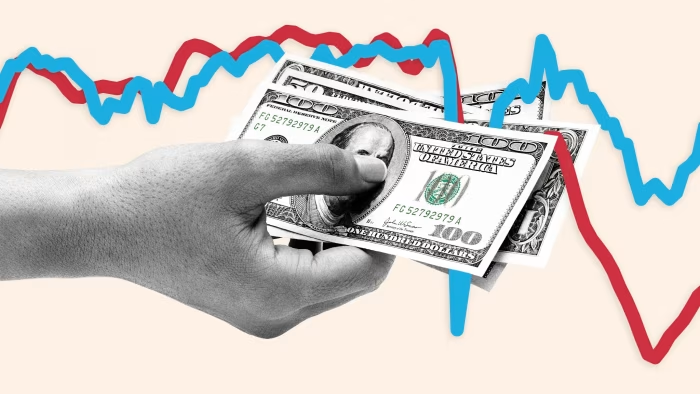Recessions hit both people and businesses hard. But, the impact varies across different industries. Some sectors face big challenges while others find opportunities to grow. Knowing how different industries react to tough times can guide both companies and consumers through economic hardships.
Key Takeaways
- Certain professions, such as accountants and financial advisors, experience increased demand during economic downturns as people seek guidance on navigating financial challenges.
- Healthcare is often considered a recession-proof industry, as people’s need for medical services remains stable regardless of the economy’s state.
- Discount retailers, home improvement stores, and auto repair shops can benefit from consumers’ shift toward more affordable and necessary purchases during tough financial times.
- The housing market is typically hit hard by recessions, as lending tightens and demand for new construction slows.
- Consumers may adjust their spending habits, reducing discretionary purchases and focusing more on essential goods and services.
Resilient Professions During Economic Downturns
In tough economic times, some jobs still do well. Accountants and financial advisors see more work. This is because people and businesses lean on them for financial help.
They guide clients through tax laws and rules, which are always changing. As new economic policies are put in place, their advice is priceless. They help folks and companies save money where they can, important when funds are low.
Accountants and Financial Advisors in High Demand
During downturns, financial advisors are also busier. They provide advice on keeping assets safe, which is key in unstable markets. Accountants and financial advisors help clients grab tax benefits and protect their wealth.
| Profession | Reasons for High Demand |
|---|---|
| Accountants |
|
| Financial Advisors |
|
“Accountants and financial advisors are essential in helping clients take advantage of tax benefits and implement effective asset protection plans.”
Healthcare: A Recession-Proof Industry

In uncertain economic times, healthcare stays strong. Its services and care are always needed, not matter the financial climate. This means that jobs in healthcare tend to stay safe when other fields suffer.
Why is healthcare so stable? It’s because people always need medical help, from regular check-ups to emergencies. Even when money is tight, these needs don’t go away.
Moreover, the healthcare world is constantly improving. Reasons for this include:
- Our population is aging, leading to more healthcare needs
- New technology and treatments keep our medical knowledge growing
- Laws that make healthcare more affordable are being made
So, even when the economy is up and down, healthcare jobs are steady. This is because their work is so vital, and they keep moving forward with new ways to help people stay healthy.
| Industry Sector | Recession-Proof Characteristics |
|---|---|
| Healthcare |
|
To sum up, the healthcare field stands strong, even in an economic storm. As a key player in providing care and services, it offers ongoing jobs and helps keep the economy moving forward.
Financial Times: Economic Insight Becomes Invaluable
During tough economic times, solid financial and economic advice is crucial. Experts like industry consultants, government advisors, and media figures are needed more than ever. They help the public, businesses, and policymakers tackle recession challenges.
Subscribing to the Financial Times means getting deep analysis and expert views. This helps readers make smart choices. The Financial Times and similar sources tap into vast networks and deep economic knowledge. They offer a full look at the changing financial world.
“When the future of the economy is uncertain, people crave reliable information and analysis more than ever before,” noted financial consultant Emily Wilkinson. “That’s why publications like the Financial Times become invaluable resources during times of economic turbulence.”
When governments roll out stimulus plans and businesses change because of consumers, insights from the Financial Times are key. These voices guide policymakers and business leaders. They help them make wise moves for long-term success.
The Financial Times doesn’t just report. It dives into how government choices affect things, what’s next for industries, and the world’s economic future. For many dealing with financial challenges, it and other similar sources are lifelines of knowledge and advice.
| Profession | Demand During Recession |
|---|---|
| Consultants | High |
| Government Policy Advisors | High |
| Media Personalities | High |
Thriving in the DIY Economy

During tough times, many turn to DIY projects at home instead of big changes or moving. This choice helps companies like The Home Depot and Lowe’s, as well as places for auto repairs. Also, shops that offer discounts get more business because people are looking for cheaper options.
Home Improvement, Auto Repair, and Discount Retailers
The DIY economy grows because of money issues. People want to save, so they do things themselves. Home improvement stores like The Home Depot and Lowe’s have been selling more. This is because they do their own repairs, paint jobs and garden work.
Plus, auto repair shops are busier. More folks are choosing to fix their cars instead of buying new ones. In tough times, discount retailers also do well. People turn to them for cheaper options on clothes, electronics and more.
| Industry | Impact of DIY Economy |
|---|---|
| Home Improvement | Surge in sales at stores like The Home Depot and Lowe’s as homeowners take on DIY projects |
| Auto Repair | Increased business at auto repair shops as drivers opt to maintain and fix their vehicles |
| Discount Retailers | Growing popularity as consumers seek out affordable alternatives to luxury and discretionary purchases |
Choosing DIY in hard financial times shows how both people and companies can adapt. With a desire to save money, the sectors focusing on self-reliance and affordability thrive. This includes home improvement, auto repairs, and discount stores.
Housing Market Shifts

During uncertain economic times, the housing market often shifts a lot. New home construction can slow down. But, some real estate professionals, like home stagers and rental agents, may see more work as the market gets busier.
People with financial troubles might sell their homes. They might hire home stagers to make their homes look better. Home stagers know how to make a home appealing to buyers by using smart designs and marketing.
Others might not buy homes and choose to rent instead. This makes rental agents and property management companies busier. They help find good homes for renters and take care of rental homes.
The housing market might not be steady during tough economic times. But, smart real estate professionals can still do well. They understand the changing needs of people who want to buy or rent.
In conclusion, during hard financial times, the housing market faces big changes. Yet, experts in the real estate field can find success with the right plans. Whether it’s through setting up homes for sale or managing rentals, they make a big difference for everyone involved in the real estate world.
Staple Goods and Necessities

The economy taking a downturn can change how people spend their money. When times are tough, many turn to buying only what they truly need. This means more sales at grocery stores, bargain stores, and discount retailers.
In times of recession, people often dine out less and cook at home more. This leads to buying more food from grocery stores. To save money, shoppers pick cheaper brands and buy in bulk.
Bargain stores and discount retailers also see higher sales. This is because everyone, regardless of income, looks for deals. They buy essentials like cleaning supplies there too.
This change in spending habits is marked by a focus on the basics. Grocery stores, bargain stores, and discount retailers are key. They help meet the growing demand for low-cost goods.
“In times of economic uncertainty, consumers tend to prioritize essential purchases and seek out more affordable options, leading to a surge in demand for staple goods and necessities.”
Adapting to Changing Consumer Behavior

Recessions often make people spend their money more carefully. They choose to buy cheaper things over luxury items. But, some products, like personal care items, stay popular even in hard times.
Shifts in Discretionary Spending and Affordable Luxuries
When the economy is down, businesses need to change. They should focus on what people want to buy now. This often means finding things that feel special but don’t cost too much.
For example, in tough times, spending on expensive bags might drop. Yet, there’s a rise in buying affordable yet quality makeup or skin products. People still like to take care of themselves, even if they spend less on big splurges.
Investors might then look to businesses that stay strong in a recession. Shops that offer good deals and value stand out. They keep things affordable for consumers.
| Sector | Resilience During Recessions |
|---|---|
| Discount Retailers | Offer affordable alternatives to mainstream brands, catering to value-conscious consumers |
| Bargain Stores | Provide deep discounts on a wide range of products, appealing to budget-minded shoppers |
| Personal Care Products | Maintain demand for affordable self-care items, such as cosmetics and skincare |
By knowing and responding to what people want, businesses can do well even in tough times. This helps them succeed when the market changes.
Government Programs and Stimulus Measures

During hard times, governments set up different programs to help. This support is for companies, industries, and people. It offers chances for experts like accountants to guide others through these new changes and benefits.
These programs and measures aid during tough times by:
- Giving tax breaks to businesses and people
- Offering loans with low interests
- Making laws easier to grow or start businesses
- Providing direct help to struggling industries or people
Professionals follow these government programs and stimulus measures closely. This lets them give solid advice, helping their clients adapt to changing situations. They also assist with any new rules on taxes, loans, or industry practices, which can affect everyone’s finances during these challenges. Good advice is key in these times.
| Government Program | Description | Potential Impact |
|---|---|---|
| Small Business Loan Program | Provides low-interest loans and financial assistance to eligible small businesses | Helps smaller businesses survive, keep workers, and grow during hard times |
| Homeowner Assistance Fund | Offers help with mortgage payments and avoiding home foreclosures for those who qualify | Keeps the housing market stable and stops many from losing their homes during bad economy |
| Job Training and Reskilling Grants | Offers funds for training programs and job skill learning | Makes workers ready for new job needs and helps secure future jobs |
Knowing about and using these government programs and stimulus measures help in giving advice. Professionals guide clients on ways to face economic difficulties and look forward to a better future.
Also Read : What Does Gross Domestic Product Tell Us About A Country’s Economy?
Conclusion
In tough times, some industries actually do well by changing how they serve people. Jobs like accounting and healthcare get busier, as do those in finance. Plus, companies offering what we really need or cheaper options also get more attention. This is often thanks to help from the government, like special programs to boost the economy.
It’s key to know which businesses tend to do okay even when times are hard. This knowledge can guide both people and companies to smoother sailing when the economy isn’t doing great. By spotting these trends and understanding the help available, we can pick careers or make business moves that are less affected by ups and downs.
When facing financial challenges, being open to change is crucial. Keeping up with the market and seeking available support can lead us through. It’s all about being smart and ready to adjust as needed, which can keep us on the path to success, no matter how the economy is faring.





